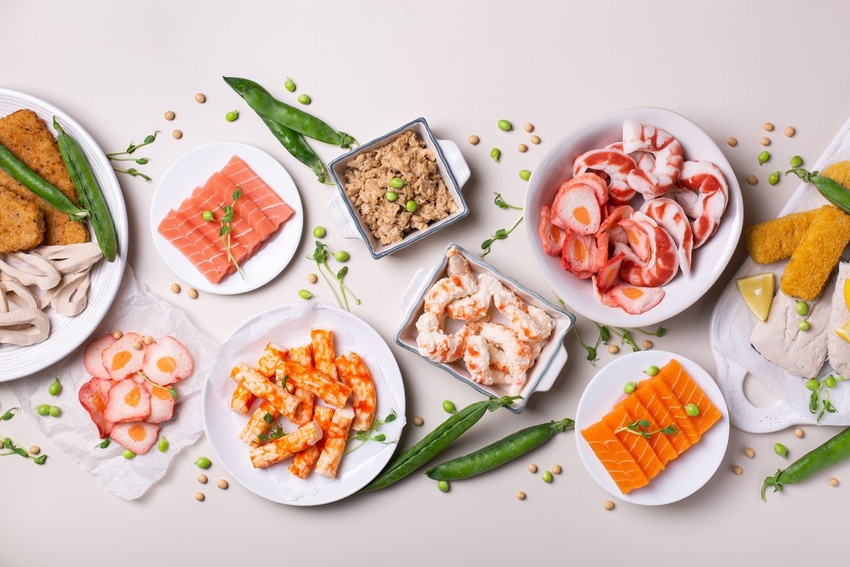2023 in 10 Top Stories: This year, food got greener, more inclusive and went fishing for plants
It was a year full of twists and turns, but always something to savor. Sustainability ruled the roost, alt-sweeteners got swept into a whirlwind, California decided to ban 5 food ingredients. As always, there's so much more to devour as we list our Top 10 stories of 2023.

At a Glance
- California to ban 5 ingredients: Red dye, BVO, and others got the boot, sending shockwaves through the industry.
- From "tuna" rolls to salmon fillets, plant-based alternatives were no longer just sideshows, but main course contenders.
- Sustainability ruled the roost: From regenerative farms to reducing waste, eco-consciousness was one of the hottest trends.
One thing’s for certain: It’s never a dull moment covering this industry. The year 2023 had its ups and downs, with more product releases than usual, yet an unimaginable number of regulatory issues as well.
The Food & Beverage Insider team was there to document as much as possible, keeping our ears to the ground, meeting as many experts in person at various shows and just generally being in the mix of everything coming down the pipeline.
Here, we’ve outlined our Top 10 stories of the year.
Sustainability was a big buzzword—and big business.
Whether it was regenerative agriculture, reducing food waste and/or packaging, sustainability was always a part of the discussion. “Initially, the perception was that every plastic was bad plastic, however, the role that plastic has had in making food safe, sanitary, [with a] long shelf life [and] reducing waste [should not go ignored],” explained Clarice Owens, co-founder of Pescavore’ Ahi tuna jerky strips, in a profile about the company she owns with her husband. “You must look at a total lifecycle analysis anytime you’re looking at packaging.”
Alt-sweeteners were a controversial subject in 2023.
It all started back in February with a polarizing Cleveland Clinic study that linked erythritol to heart attack and stroke. “Our study shows that when participants consumed an artificially sweetened beverage with an amount of erythritol found in many processed foods, markedly elevated levels in the blood are observed for days—levels well above those observed to enhance clotting risks,” said Dr. Stanley Hazen, chairman for the Department of Cardiovascular & Metabolic Sciences in Lerner Research Institute and co-section head of Preventive Cardiology at Cleveland Clinic. While Hazen admitted that the study required “more in-depth research” to be accurate, aspartame was soon in the hot seat. In its case, the long-time alt-sweetener had some experts in its corner, such as the Calorie Control Council. “The Joint FAO/WHO Expert Committee on Food Additives (JECFA) ruling not only confirms the four decades of science concluding aspartame is safe but also provides real-life context around the safe consumption of this ingredient,” Robert Rankin, president of Calorie Control Council, said.
Creating a more inclusive food system key in 2023.
No doubt it’s refreshing seeing more diversity at every level throughout the food system. And one group who made it their mission to be at the forefront of this revolution was Dine Diaspora, comprised of Nina Oduro and Maame Boakye, with their first-ever Black Women in Food Summit in Washington, D.C. “… the industry is vast and encompasses labor across the food value chain, from production to processing and waste disposal,” explained Oduro, co-founder of Dine Diaspora. “Black women play critical roles across the value chain, and our awards are intentionally designed to be expansive in recognizing the variety of ways that Black women participate. This provides people the opportunity to access examples of Black women’s contributions across the industry and ensures that the contributions of Black women are celebrated in a space where their work can sometimes be diminished or even erased.”
California moved to ban 5 food ingredients.
We closely followed this story from day 1, so we cannot possibly post every article update here. But what we can tell you is that they were so detailed to the point that we eventually had a direct line to some of the top legislators close to the issue. The five proposed food ingredients—red dye No. 3, brominated vegetable oil (BVO), potassium bromate, propylparaben and titanium dioxide—“were found to be particularly heinous upon careful review,” according to Dana Alpert, senior legislative and press aide, office of California Assemblymember Jesse Gabriel. After the governor signed the bill in October (it goes into effect in 2027), FDA is now considering following suit. We’ll certainly stay on top of this one in 2024.
The ongoing Israel-Hamas conflict affected the supply chain.
Due to the ongoing Israel-Hamas war, many Israeli food science and nutraceutical companies were unable to attend this year’s SupplySide West/ Food ingredients North America show. They were affected by employees being called up for military service, challenges in personnel and a focus on shortening international supply chains in preparation for future disruptions. “In times of conflict or disruptions in the supply chain, it becomes increasingly evident that countries and industries need to prioritize investments in programs and solutions aimed at shortening the supply chain and promoting local production of goods,” Itay Dana, co-founder and VP of business development of Israeli plant-based ingredient startup Novella, said.
Plant-based seafood exploded in 2023.
Let’s reflect on the fact that plant-based seafood has come a long way since alt-fish nuggets and fried shrimp first surfaced. Formulators have truly leaned into the challenges of replicating fish and shellfish as documented in our first-ever coverage of Plant Based World Expo North America. There, we checked out companies like The Plant Based Seafood Co., PLNT and Jinka, which showcased innovations ranging from spicy “tuna” rolls made from soy and wheat proteins to a salmon fillet made with pea protein. “I think that we’ll continue to see the emergence of new ingredients that have benefits that maybe we hadn’t been thinking about in the past,” Ben Davis, content chair and strategic advisor at Plant Based World Expo North America, said. “Now, it’s really about finding all the right solutions in a practical and grounded way.”
Supplements primed to transition to mainstream F&B products.
Another major story out of SSW/FiNA was how more functional ingredients traditionally reserved for supplements are now being infused into food and beverage products. “Resonating with the audience’s needs, lifestyles and routines will elevate these ingredients’ public perceptions and further their evolution into daily use foods and beverages,” said Kantha Shelke, Ph.D., CFS, principal at Corvus Blue LLC.
Finally, some relief for pet food.
According to the Association of American Feed Control Officials (AAFCO), this is the first major packaging update made to pet food in more than 40 years. The new labeling guidelines will include treats and supplements. AFFCO’s role in pet food regulations is simply to establish model language that may be adopted into law. FDA, which oversees regulatory actions, is active in AAFCO. “AAFCO and FDA have a memorandum of understanding (MOU) in place that outlines the AAFCO ingredient definition request process and the respective roles of each organization within that process,” Austin Therrell, executive director of AAFCO, said. “FDA members have been part of the development process for the updated model regulations and are very supportive of the changes.”
Women’s health emerged as a big category for 2023.
As Lizzo once crooned, “It’s about time!” Food developers are finally paying attention to the growing needs of women with products targeting pre-natal, perimenopausal and menopausal issues. This has led to a surge in wellness drinks in this category, particularly through functional beverages offering a more enjoyable and accessible alternative to traditional supplements. “A delicious, functional drink fits the bill for women looking to support mental health, the gut microbiome, aging or skincare,” said Philip Caputo, marketing and consumer insights manager at Virginia Dare. “Functional beverages can even be social experiences when combined with other trends like alcohol alternatives.”
How one company makes the world’s most expensive spice accessible for all.
Farmer-owned co-op Heray Spice sources most of its single-origin ingredients, particularly saffron, in Afghanistan. As the company continues growth, its founders are finding fresh and innovative ways of developing new products with the luxury spice, from saffron oil and saffron liquid to upcycling the flower’s typically unused parts. “The idea of saffron oil and liquid came up during conversations with several chefs who were looking for a cost-effective and easy-to-measure saffron product,” said Mohammad Salehi, CEO/co-founder of Heray Spice. “Liquids are a more reliable form of measurement compared to a pinch, which can vary in size depending on the individual.”
About the Author(s)
You May Also Like






